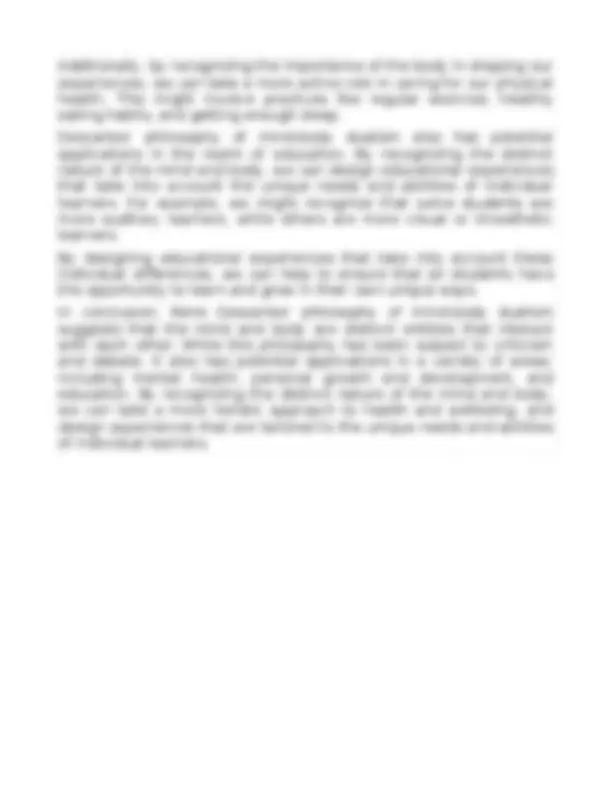



Study with the several resources on Docsity

Earn points by helping other students or get them with a premium plan


Prepare for your exams
Study with the several resources on Docsity

Earn points to download
Earn points by helping other students or get them with a premium plan
Community
Ask the community for help and clear up your study doubts
Discover the best universities in your country according to Docsity users
Free resources
Download our free guides on studying techniques, anxiety management strategies, and thesis advice from Docsity tutors
The essay discusses Rene Descartes' philosophy of mind-body dualism and its potential applications in daily life. It covers topics such as the distinct nature of the mind and body, their interaction, and potential applications in mental health, personal growth and development, and education. The essay argues that by recognizing the importance of both the mind and body, individuals can take a more holistic approach to health and wellbeing, and design experiences tailored to individual difference
Typology: Transcriptions
1 / 2

This page cannot be seen from the preview
Don't miss anything!


Exploring the Potential Applications of Rene Descartes' Philosophy of Mind-Body Dualismin Daily Life Rene Descartes was a 17th century French philosopher who is perhaps best known for his contributions to the philosophy of mind and body. Descartes proposed a dualistic view of the mind and body, suggesting that they are distinct entities that interact with each other. In this essay, we will explore Descartes' philosophy of mind-body dualism and consider its potential applications in daily life. Descartes' philosophy of mind-body dualism suggests that the mind and body are separate entities that interact with each other. According to Descartes, the mind is a non-physical entity that is responsible for consciousness, thought, and emotion. The body, on the other hand, is a physical entity that is subject to the laws of physics and biology. Descartes believed that the mind and body interact with each other through the pineal gland, a small structure located in the brain. He suggested that the pineal gland acts as a mediator between the mind and body, allowing them to communicate with each other. One of the potential applications of Descartes' philosophy of mind- body dualism is in the realm of mental health. By recognizing the distinct nature of the mind and body, we can better understand the complex interplay between our thoughts and emotions and our physical health. For example, research has shown that stress and other negative emotions can have a negative impact on physical health, while positive emotions can have a positive impact. By recognizing the importance of both the mind and body in overall health and wellbeing, we can take a more holistic approach to healthcare. This might involve practices like mindfulness meditation, which can help us to become more aware of the connection between our thoughts and emotions and our physical sensations. Another potential application of Descartes' philosophy of mind-body dualism is in the realm of personal growth and development. By recognizing the importance of the mind in shaping our experiences, we can take a more active role in cultivating positive thought patterns and beliefs. This might involve practices like cognitive-behavioral therapy, which can help us to identify and challenge negative thought patterns.
Additionally, by recognizing the importance of the body in shaping our experiences, we can take a more active role in caring for our physical health. This might involve practices like regular exercise, healthy eating habits, and getting enough sleep. Descartes' philosophy of mind-body dualism also has potential applications in the realm of education. By recognizing the distinct nature of the mind and body, we can design educational experiences that take into account the unique needs and abilities of individual learners. For example, we might recognize that some students are more auditory learners, while others are more visual or kinesthetic learners. By designing educational experiences that take into account these individual differences, we can help to ensure that all students have the opportunity to learn and grow in their own unique ways. In conclusion, Rene Descartes' philosophy of mind-body dualism suggests that the mind and body are distinct entities that interact with each other. While this philosophy has been subject to criticism and debate, it also has potential applications in a variety of areas, including mental health, personal growth and development, and education. By recognizing the distinct nature of the mind and body, we can take a more holistic approach to health and wellbeing, and design experiences that are tailored to the unique needs and abilities of individual learners.